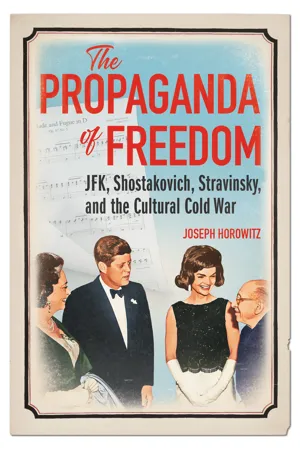
The Propaganda of Freedom
JFK, Shostakovich, Stravinsky, and the Cultural Cold War
- 248 pages
- English
- ePUB (mobile friendly)
- Available on iOS & Android
About this book
Eloquently extolled by President John F. Kennedy, the idea that only artists in free societies can produce great art became a bedrock assumption of the Cold War. That this conviction defied centuries of historical evidence--to say nothing of achievements within the Soviet Union--failed to impact impregnable cultural Cold War doctrine.
Joseph Horowitz writes: "That so many fine minds could have cheapened freedom by over-praising it, turning it into a reductionist propaganda mantra, is one measure of the intellectual cost of the Cold War." He shows how the efforts of the CIA-funded Congress for Cultural Freedom were distorted by an anti-totalitarian "psychology of exile" traceable to its secretary general, the displaced Russian aristocrat/composer Nicolas Nabokov, and to Nabokov's hero Igor Stravinsky.
In counterpoint, Horowitz investigates personal, social, and political factors that actually shape the creative act. He here focuses on Stravinsky, who in Los Angeles experienced a "freedom not to matter," and Dmitri Shostakovich, who was both victim and beneficiary of Soviet cultural policies. He also takes a fresh look at cultural exchange and explores paradoxical similarities and differences framing the popularization of classical music in the Soviet Union and the United States. In closing, he assesses the Kennedy administration's arts advocacy initiatives and their pertinence to today's fraught American national identity.
Challenging long-entrenched myths, The Propaganda of Freedom newly explores the tangled relationship between the ideology of freedom and ideals of cultural achievement.
Frequently asked questions
- Essential is ideal for learners and professionals who enjoy exploring a wide range of subjects. Access the Essential Library with 800,000+ trusted titles and best-sellers across business, personal growth, and the humanities. Includes unlimited reading time and Standard Read Aloud voice.
- Complete: Perfect for advanced learners and researchers needing full, unrestricted access. Unlock 1.4M+ books across hundreds of subjects, including academic and specialized titles. The Complete Plan also includes advanced features like Premium Read Aloud and Research Assistant.
Please note we cannot support devices running on iOS 13 and Android 7 or earlier. Learn more about using the app.
Information
Table of contents
- Cover Page
- Title Page
- Copyright Page
- Contents
- Preface
- Foreword: Why and What
- 1 JFK, the Artist, and “Free Societies”: A Cold War Myth
- 2 Nicolas Nabokov and the Cultural Cold War
- 3 Lines of Battle: The Case for Stravinsky; The Case against Shostakovich
- 4 CIA Cultural Battlegrounds: New York and Paris
- 5 Survival Strategies: Stravinsky and Shostakovich
- 6 Survival Strategies: Nicolas Nabokov
- 7 Cold War Music, East and West
- 8 Enter Cultural Exchange
- Summing Up: Culture, the State, and the “Propaganda of Freedom”
- Afterword: The Arts, National Purpose, and the Pandemic
- Appendix A: Nicolas Nabokov, “The Case of Dmitri Shostakovitch” (Harper’s Magazine, March 1943)
- Appendix B: President John F. Kennedy/Arthur Schlesinger Jr., “The Amherst Speech” (October 26, 1963)
- Notes
- Index